Languages
“Oh, it was my cruel parents who first did me trepan”
To trepan means to perforate the skull with a drill. Which makes the title of this old folk song from Norwich extremely odd.However, the song itself isn't actually about parents drilling a hole in the skull of their child, despite the title. Turns out, 'trepan' has another, archaic meaning, which is to trap or ensnare, and that's how it's used here.
But even though it isn't about pediatric brain surgery, it's still quite a dark and violent song.
It's performed below by Jon Wilks. He starts singing the song about halfway through the clip.
They married me to an old man for the sake of money and land.
If they'd married me to a young man without a penny at all,
He'd have took me in his arms and have loved me all the more.
Oh, it's, "Hush, my dearest Nancy, oh, wait 'til we go to town,
I'll buy you a lady's bonney, likewise a mus-e-lin gown;
There is no lady in the land your beauty can compare,
And I'll buy you a little lapdog to follow you everywhere."
"I want none of your little lapdogs nor none of your gentle care;
It's a pity that such an old man my beauty you should snare.
I am not sixteen years of age and scarcely in my bloom;
Oh, you are my cruel torment, both morning, night and noon."
When he comes to bed at night he's as cold as any clay:
His feet are as cold at midnight as corpse, I've heard them say;
His pipes are out of order and his old flute's never in tune:
Oh, I wish that he was dead and a young man in the room.
[Now some they do persuade me to drown him in a well,
And others do persuade me to grind him in a mill.
I'd rather take my own advice and tie him to a stake,]
Oh I'll get a big stick and labour him well, until his bones I break.
Source of lyrics
Posted By: Alex - Fri Jun 26, 2020 -
Comments (1)
Category: Languages, Music
Informative Swimwear
In 2005, Robert Dickey and Ruth Stephens filed a patent application for "swimwear as information device." Their idea was to make a line of swimwear that displayed maritime signal flags. This would allow people to communicate messages to those around them via their swimwear. They explained:The possible messages one could send seemed limitless, but they were never granted a patent. Perhaps the idea of messages on clothing was deemed too obvious.
There's also the limitation that only people conversant with maritime signal flags could decode the messages, which would make the various 'stay away' messages somewhat pointless.
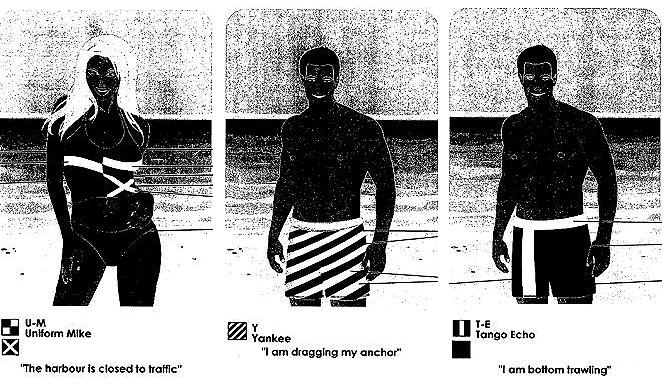
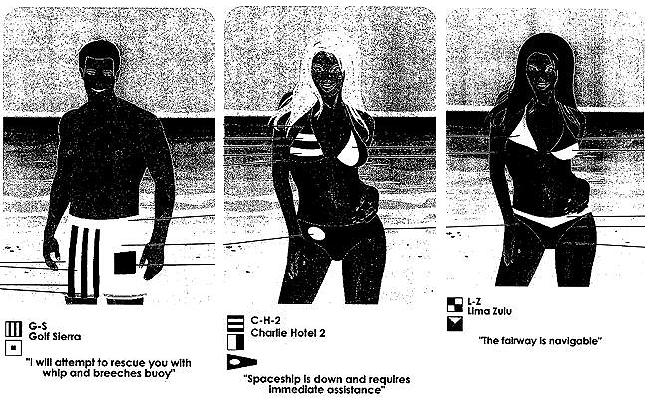

Posted By: Alex - Sun Apr 26, 2020 -
Comments (3)
Category: Boats, Fashion, Inventions, Patents, Languages, Double Entendres and Nudge-Nudge, Wink-Wink
Augmented Roman
Augmented Roman was one of the periodic attempts to improve and rationalize the English alphabet. Introduced in the 1960s by Sir James Pitman, the idea was to expand the alphabet from 26 letters to 43, and to have each letter represent a single, distinct sound. Unlike the current alphabet in which letters can have different sounds depending on context.Proponents of Augmented Roman imagined teaching children to read using this improved alphabet, and then having the kids switch over to the standard alphabet later. And that's where the plan ran aground, because most people figured that if kids have to learn the standard alphabet anyway, just teach them that from the beginning.
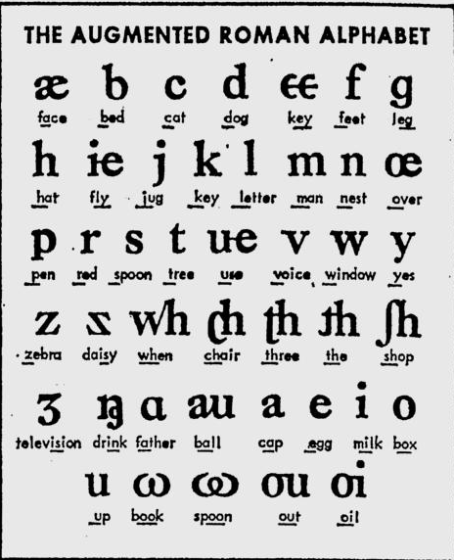
image source: omnivorenz

Tampa Bay Times - Sep 2, 1962
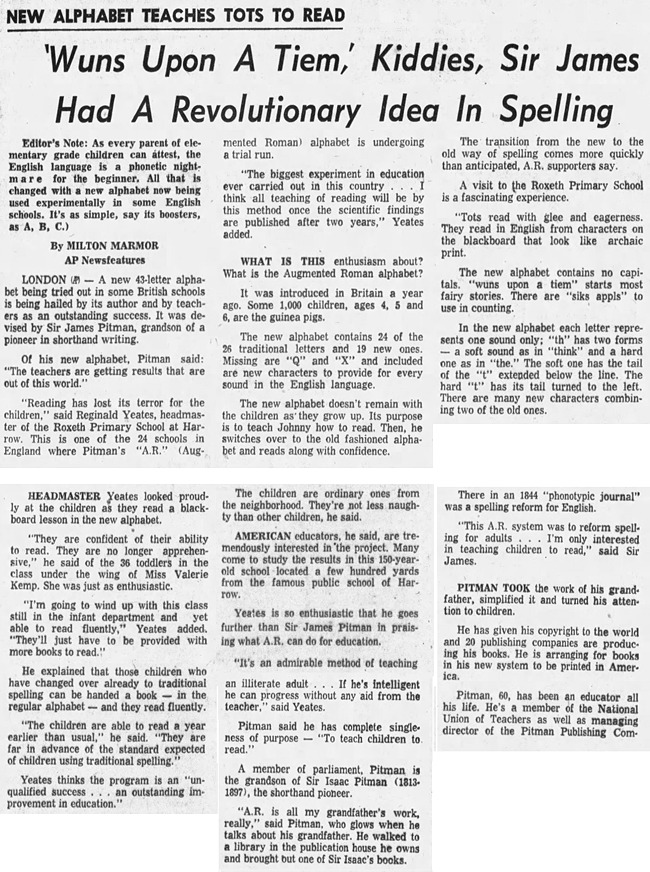
Tampa Bay Times - Sep 2, 1962
Posted By: Alex - Fri Oct 25, 2019 -
Comments (7)
Category: Education, Languages, 1960s
Flapper Dictionary
As defined by Wikipedia, "Flappers were a generation of young Western women in the 1920s who wore skirts, bobbed their hair, listened to jazz, and flaunted their disdain for what was then considered acceptable behavior. Flappers were seen as brash for wearing excessive makeup, drinking, smoking cigarettes, driving automobiles, treating sex in a casual manner, and otherwise flouting social and sexual norms."A "Flapper Dictionary" appeared in various newspapers and magazines in 1922. Selections below. Even more flapper terms can be found at Book Flaps and Click Americana.
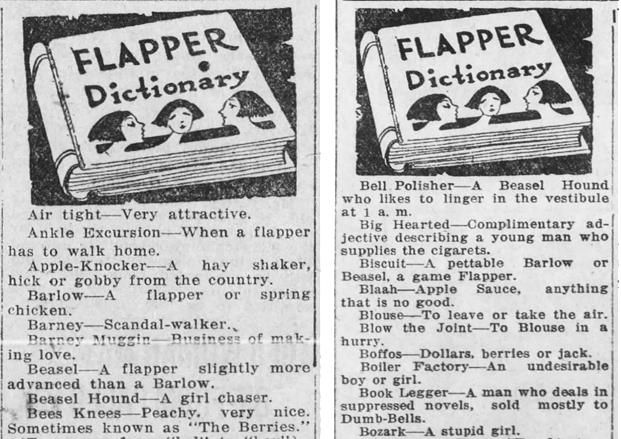
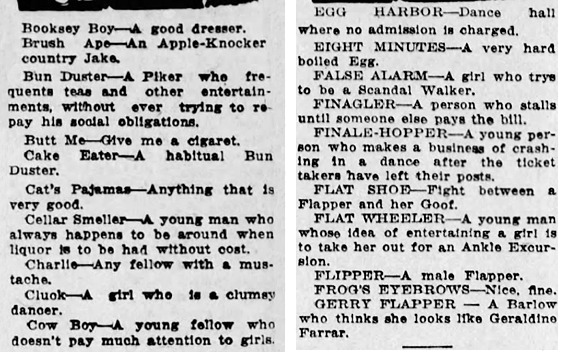
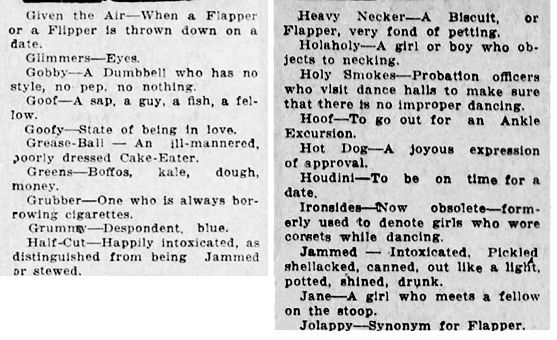
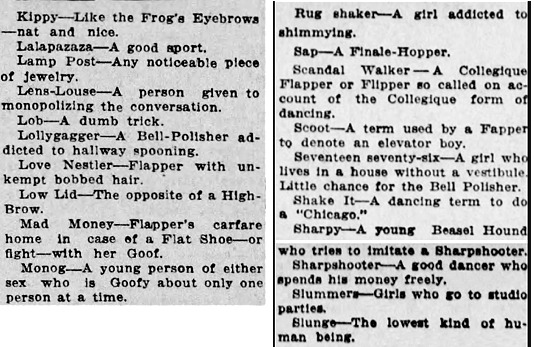
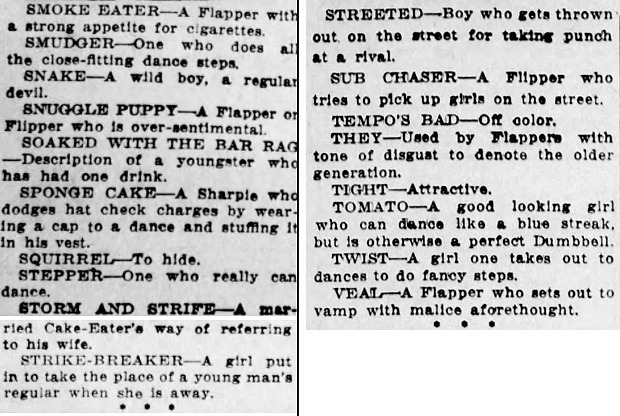
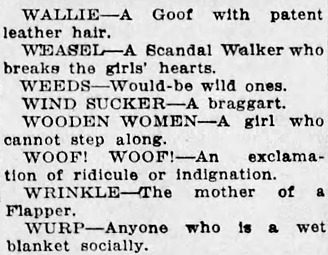
New Castle Herald - Apr 1922
Posted By: Alex - Tue Oct 08, 2019 -
Comments (4)
Category: Languages, Slang, Subcultures, 1920s
The Adequate Wiring Bureau
Nowadays, to describe something as 'adequate' sounds like it's damning with faint praise. It doesn't come across a ringing endorsement. It's like getting a 'B' on a homework assignment instead of an 'A'. It's merely adequate, not great.But evidently the word once had a much stronger positive association in general usage, as seen in the existence of the National Adequate Wiring Bureau. Many states also had their own Bureaus of Adequate Wiring. Their goal was to encourage homes to have proper, code-compliant electrical wiring.
As far as I can tell, the National Adequate Wiring Bureau came into existence as early as the 1890s, but there is no such thing today. By the 1970s, Adequate Wiring Bureaus had quietly begun to change their names, dropping the word 'adequate'.
It reminds me of the "Miss Typical" awards that used to be bestowed on young women. In today's culture, being typical or adequate no longer sounds like a compliment.

Brandon Times - Mar 12, 1953
I like this 1974 ad from the Adequate Wiring Bureau of Western New York, which used the idea of the sun suddenly going out, and the Earth being plunged into a freezing-cold apocalypse, as a way to promote the need for adequate wiring.
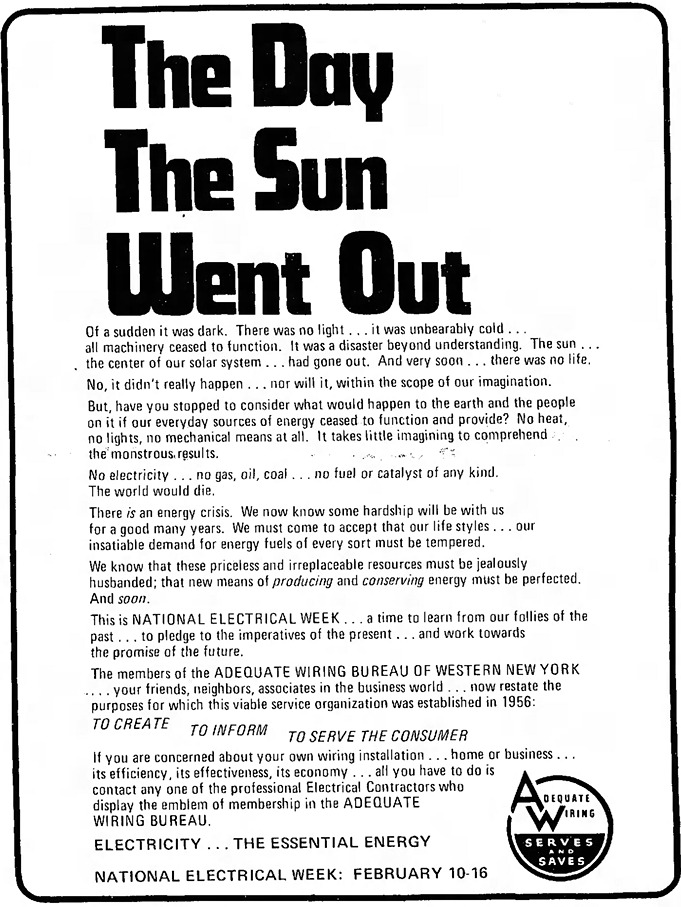
Wellsville Daily Reporter - Feb 13, 1974
Posted By: Alex - Sat Sep 28, 2019 -
Comments (1)
Category: Languages, Odd Names, Public Utilities, Power Generation
Spanish for the California farmer
First published in 1981. It included translations for phrases a farmer might need to communicate with his workers, such as, “Clean up your camp. You live like a f**king pig.”One of the authors noted: “This is a practical book. This is not a grammar book. If you want to have beautiful Spanish, you can get your grammar books and go to school. If you want to be practical in a farm case, you have to know the slang. People use the language.”
The book is available on Amazon, though listed as “Out of Print — Limited Availability.”

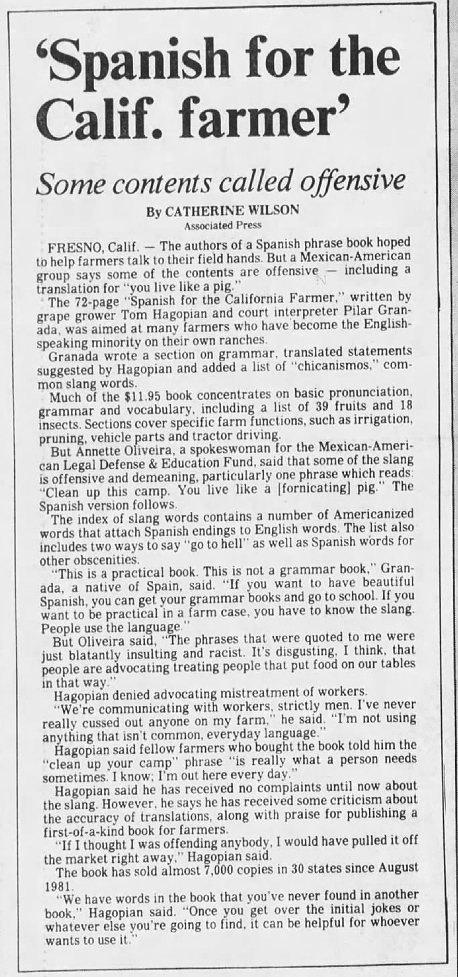
Wilmington Morning News - Jan 9, 1983
Posted By: Alex - Mon Jan 28, 2019 -
Comments (7)
Category: Languages, Books, 1980s
Follies of the Madmen #398
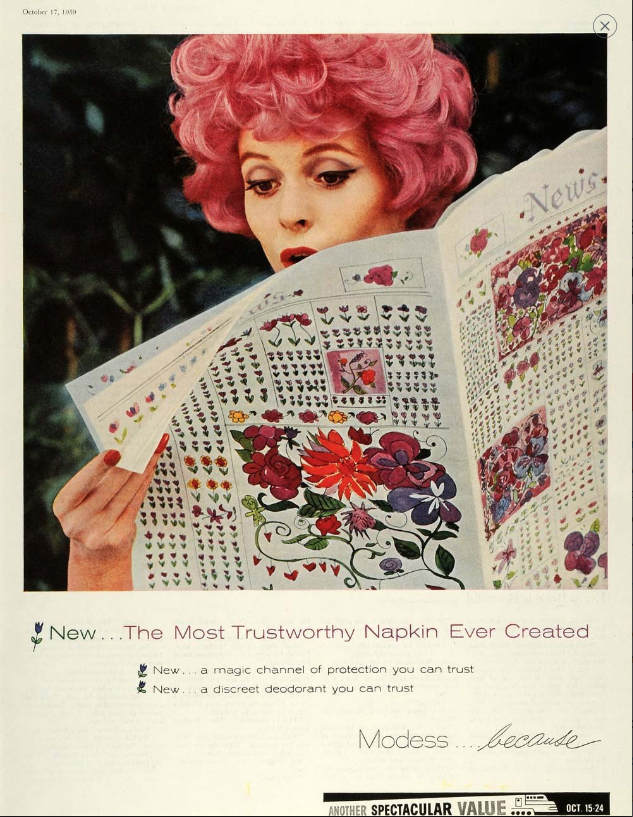
Usage of this product enables user to read the mystical language of flowers.
Original ad here.
Posted By: Paul - Thu Nov 29, 2018 -
Comments (1)
Category: Business, Advertising, Hygiene, Body Fluids, Languages, Nature, 1950s
You Know Scholarship
From Sleeping Dogs Don't Lay: Practical Advice For The Grammatically Challenged by Richard Lederer and Richard DowisThe first year’s winner was thirteen-year-old Dalton Hartman, who submitted a tape with forty-one you knows in four minutes, thirty-eight seconds. The next year, a fifth grader named Jason Rich took the prize. His tape, a twelve-minute interview with a basketball coach, had sixty-four you knows...
Colonel Oldfield has made arrangement in his estate for continuation of the contest.
Oldfield died in 2003. I can't find any evidence that the scholarship did continue after his death. This LA Times article has more info about his somewhat eccentric philanthropy.

Des Moines Register - Feb 16, 1997
Posted By: Alex - Sat Nov 10, 2018 -
Comments (3)
Category: Awards, Prizes, Competitions and Contests, Languages
Prisencolinensinainciusol
From npr.org:"Prisencolinensinainciusol" is so nonsensical that Celentano didn't even write down the lyrics, but instead improvised them over a looped beat.
Posted By: Alex - Sat Aug 11, 2018 -
Comments (6)
Category: Languages, Music, 1970s
Magma’s Invented Language
Vander invented a constructed language, Kobaïan, in which most lyrics are sung. In a 1977 interview with Vander and long-time Magma vocalist Klaus Blasquiz, Blasquiz said that Kobaïan is a "phonetic language made by elements of the Slavonic and Germanic languages to be able to express some things musically. The language has of course a content, but not word by word."[1] Vander himself has said that, "When I wrote, the sounds [of Kobaïan] came naturally with it—I didn’t intellectualise the process by saying 'Ok, now I’m going to write some words in a particular language', it was really sounds that were coming at the same time as the music."[2] Later albums tell different stories set in more ancient times; however, the Kobaïan language remains an integral part of the music.
Their Wikipedia page.
Posted By: Paul - Tue Feb 27, 2018 -
Comments (1)
Category: Languages, Music, 1970s, Europe, Cacophony, Dissonance, White Noise and Other Sonic Assaults

| Who We Are |
|---|
| Alex Boese Alex is the creator and curator of the Museum of Hoaxes. He's also the author of various weird, non-fiction, science-themed books such as Elephants on Acid and Psychedelic Apes. Paul Di Filippo Paul has been paid to put weird ideas into fictional form for over thirty years, in his career as a noted science fiction writer. He has recently begun blogging on many curious topics with three fellow writers at The Inferior 4+1. Contact Us |




